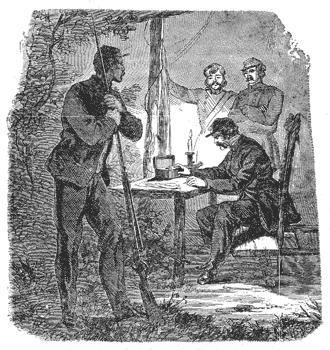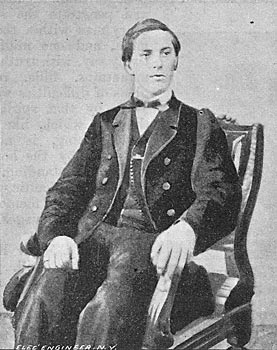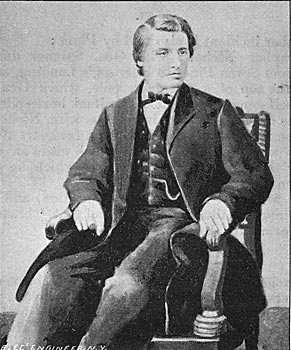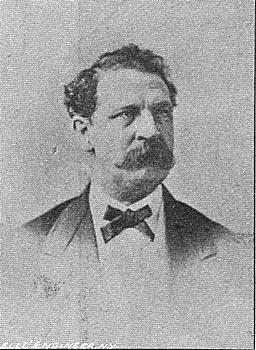[Trade Journal]
Publication: The Electrical Engineer
New York, NY, United States
vol. 12, no. 172, p. 203-206, col. 1-2
THE WORK OF THE U. S. MILITARY TELEGRAPH CORPS.
BY
Madison Buell
I.
TO what and to whom can the greatest credit be given for the favorable termination of the civil war?
Setting aside the military skill of the commanders of our armies and the bravery of the men who composed them, a close observer of the events of the war can only come to one conclusionthat steam and electricity, and the men who manipulated them, were the greatest factors, and that without them the destruction of the Union would have ensued.
 |
 |
 |
 |
 |
At the time of the attack on Fort Sumter, in 1861, the entire military force of the Government was some 16,000 regulars, principally employed in the West to hold in check marauding Indians. The first call for troops by the President was for 75,000 men; the second call, in May, 1861, resulted in bringing into the field, by July 1st, over 230,000 men, and on the 1st of December, 1861, the entire strength of the army, both volunteers and regulars, was 660,970 men. Steam ancr electricity were the great agents utilized for the gathering, concentration and distribution of this army of unparalleled magnitude, and the enormous supplies necessary for its subsistence, and in no other way could it have been done in so short a time.
 |
| With Gen. Mcdowell. (From An Old Engraving). |
It was the telegraph that bound the loyal States together and stimulated civil and military authorities to greater exertion by the almost limitless contributions of men and money. It was in truth an electric) nerve that united them, consolidated their power, inspired them with courage and hope and and finally led them to victory.
As an illustration of the marvelous facilities of steam and electricity as the great saving factors in the war, let us take the battles of South Mountain and Antietam. During the battle of Antietam the following message was sent to Halleck, at Washington:
Please take military possession of the Chambersburg and Hagerstown railroad that our ammunition and supplies may be hurried up without delay. We are in the midst of the most terrible battle of the warperhaps of history. Thus far it looks well, but I have great odds against me. Hurry up all troops possible. Our loss has been terrible, but we have gained much ground. I have thrown the mass of the army on the left bank. Burnside is now attacking the right. I hold my small reserve, consisting of Porter's Fifth Corps, ready to attack the centre as soon as the flank movements are developed. I hope that God will give us a glorious victory. GEO. B. McCLELLAN, Maj.-Gen.
A mental photograph of this incident, taken at the time, would reveal in the telegraph office of the War Department at Washington the faithful military telegrapher at his instrument; and standing within hearing of the "click, click" of its armature, Lincoln, Stanton, Halleck, Eckert and others with their hearts beating rapidly. We can see them even now, men of wisdom' men of action, men pale with care, and men weary with the burden and responsibilities of a nation's welfare. All is hushedthe silence is like nightfall, broken only by the mournful beats of the instrument's armature, as if in sympathetic realization of the dreadful import of its magical sound waves. "We are in the midst of the most terrible battle of the warperhaps of history." The head and advisers of a great nation endowed with such a range of vision as to enable them by the aid of the strange and "fierce electric fire," drawn as it were from the edge of a midnight storm, almost to see the battle's progress and hear the cannon spit out their iron wrath!
The evening's gray twilight descended upon the battlefield with its twenty thousand ghastly dead and wounded, and the telegrams were deluged with the tears of the mothers and wives of the slain and wounded. You could almost hear the heart's anguish ooze out of the words as they were recorded. Instead of the peaceful orders for daily wants as now, they were like the following telegram sent the night after the battle of Antietam.
To the Chief of Ordnance,
Washington:
If you can possibly do it, force some twenty-pound Parrot -ammunition through to-night, via Hagerstown and Chambersburg, to use near Sharpsburg, Md.
GEO. B. MCCLELLAN,
Maj.-Gen.
Let the mind grasp the incident for a momenta general, after a day of bloody battle, surrounded by his killed and wounded, writes his telegram and orders his deadly supplies for the morrow's battle with as much assurance as we now order our daily marketing by the same means. Do not the two telegrams of McClellan furnish a wonderful amount of mental food for digestion and reflection in the way of illustrating the fact that steam and electricity were the saving factors of the Union?
II.
But what of the menthe bone and sinew of the whole military telegraph system? Twenty-five years or more ago they presented .a long line of rippling glory for deeds of bravery and faithfulness. To-day few are livingthe rest
"On Fame's eternal camping-ground
Their silent tents are spread;
And Glory guards with solemn round
The bivouac of the dead."
Some one has said that the world knows nothing of its greatest men; and that there are forms of greatness, or at least excellence, which "die and make no sign;" heroes without the laurel, and conquerors without the triumph. This is strictly applicable to the men who composed the U. S. Military Telegraph Corps from the date of its origin up to the present time.
The formation of the United States Military Telegraph Corps, in 1861, might readily be termed a meteoric electrical aggregation of men, beginning as it did under such men as the late E. S. Sanford, of the American Telegraph Company, and the late Col. Thomas A. Scott, of the Pennsylvania road, and Andrew Carnegie at its head, with young David Strouse as its first superintendent.
| |||
| D. H. Bates. (From A War Time Photograph). |
This aggregation, starting with those named, and D. Homer Bates, W. J. Dealy, James R. Gilmore, Madison Buell, Richard O'Brien, Jesse H. Bunnell, C. A. Jacques, H. W. Benton, Wm. Tinney, W. B. Wilson, Jesse Crouse and others as telegraphers, gradually increased at Washington, the West, and Southwest, until, at the close of the war, there was gathered a body of men unsurpassed for skill, and bravery, and faithfulness, who to this date have not received from the Government any official recognition of the invaluable services rendered as great and undisputed factors in the preservation of the Union. The remnant of the brave corps are still besieging the doors of Congress with olden-time vigor for the just recognition of a military status at the time of their service. So far it has been denied, and yet Congress could manage in ten years to increase the pension appropriations from $50,000,000 to $124,000,000. For military telegraphers of the civil war " republics are ungrateful."
The first superintendent of this corps was young David Strouse, who went to Washington with Col. Scott and Andrew Carnegie.
Young Strouse (peace to his ashes) so taxed his energies during the first part of the war that at the end of six months his life's work was done. David Strouse entered upon the scenes of the war impelled by the highest sense of duty to his country; he was found equal to its weight, and did it worthily. "Command was service; humblest service done by willing and discerning souls was glory," and David Strouse obtained it.
Of Andrew Carnegie, the messenger boy of the early days of telegraphy, and now the great iron king and millionaire, what can be said of him that has not already been published in a thousand and one forms?
Those who were so fortunate as to meet him in the early days of the war can now walk " along the pebbled shore of memory "and build up, at pleasure, their recollections of the events and his association with them.
III.
It is impossible to give in a short description even a faint conception of the character of the men who first organized the Military Telegraph system. Col. E. S. Sanford, president of the then American Telegraph Co., supplied money and material nearly a year for its support and maintenance. For its more perfect organization, however, the credit belongs solely to two men, the late Gen. Anson Stager and General Thomas T. Eckert, now General Manager of the Western Union Telegraph Co. Gen. Stager was appointed Captain and A. Q. M. of Vols. 11th of Nov. 1861, and Thomas T. Eckert received an appointment as Major and A. Q. M. July, 1862. Gen. Stager's headquarters were at Cleveland, Ohio, and Major Eckert was assigned to the Department of the Potomac. The value of the Military Telegraph was in a way recognized by Secretary Stanton in his official report to Congress Dec., 1863, as follows: "The Military Telegraph, under the general direction of Col. Stager and Major Eckert, has been of inestimable value to the service, and no corps has surpassed, few have equaled, the telegraph operators in diligence and devotion to their duties."
At the fall of Richmond, April 3, 1865, after announcing the fact, from the office window of the War Department, to the assembled multitude beneath, Secretary of War Stanton turned to the operators in the room and said: "Boys, I consider the telegraph my right arm, and if ever I can do anything for you, don't hesitate to ask it."
| |||
| A. B. Chandler. (From A War Time Photograph). |
It is now August, 1891; the "boys" are still besieging Congress for a recognition. They have followed Stanton's advice, "don't hesitate to ask." The "boys" are still asking, and are sadly realizing " With what a heavy and retarding weight does expectation load the wing of time." In June, 1864, Eckert's field telegraph was a marvelous success. Superintendent Doren built and took down an average of twenty five miles a day. All corps headquarters and many brigades were kept in constant communication with Grant's and Meade's headquarters during every engagement. Every reconnaissance made in force had telegraphic connection with headquarters, and yet notwithstanding the acknowledged vital importance of the Military Telegraph on every occasion, the "boys" are still following Stanton's advice, and are knock, knock, knocking at the Uncle Sam's bronze doors of the Capitol.
The Comte de Paris in his history of the Civil War says:
"A single example will show the importance of the Military Telegraph. Without counting the lines in existence of which possession was taken, the employees of the Government constructed five thousand kilometres during a single year of the war, and they forwarded nearly one million eight hundred thousand despatches; and sufferings and dangers were not spared those whose merit was the greater in that it was less conspicuous. More than one among them, shivering with fever in an unhealthy station, lay down with his ear against the instrument to write with a trembling hand under dictation some important despatches, whose secret he would confide to no one. Many paid with their lives for their boldness in setting up their instruments under the very fire of the enemy, and one fact, almost incredible, bears testimony to the dangers to which they were exposed. During the siege of Charleston the wire which connected the besieging batteries ran so close to the rifle pits of the Confederate skirmishers that it was frequently cut by their balls."
IV.
It has been described how McClellan relied upon the military telegraph at the battle of Antietam, and perhaps another illustration of its immense value will prove interesting as well as instructive, bringing in as it does President Lincoln and Gen. Hooker, in conversation over a wire at a critical time in the affairs of the nation.
Lee's victories on the Rappahannock in 1863 produced in his army a spirit bordering on enthusiasm, and it was in better discipline than ever. Their commissary department was, however, in such a deplorable state that supplies were an absolute necessity, and Lee determined to strike Pennsylvania. In less than two weeks he drew Hooker's army away from the Rappahannock to the upper Potomac. On his way Lee cut all the telegraph lines which connected Washington with Winchester and Martinsburg, and their loss was a serious one.
The Washington authorities, as usual, were anxious about the safety of Baltimore and the capital. In the conversation that took place over the wire between Lincoln and Hooker, the former remarked; "If the head of Lee's army is at Martinsburg and the tail of it on the plank road between Fredericksburg and Chancellorsville, the animal must be very slim somewhere. Could you not break him?" Hooker replied, "that to proceed to Winchester and have him make his appearance elsewhere would subject me to ridicule."
Honest Lincoln! How shall we ever separate the fine silken threads of feeling and loyalty that were woven in your character from the fabric of quaintness and jest, or even know where one ended and the other began? I shall never forget the time in the War Department office when little Tad Lincoln stuck his fingers in the ink and walked down alongside the row of marble tables upon which our instruments were and rubbed ink all over their tops as he went along. The writer seized him by the seat of his little pants with one hand, and with the other his collar, and walked him Spanish fashion back to the door. It suddenly opened and we were confronted by his father. It was a regular surprise party and no mistake. Mr. Lincoln looked at the writer, and the latter held up little Tad's bedaubed fingers and pointed to the marble-top tables. Lincoln burst out laughing, and taking the little youngster up in his great, long arms and hugging him closely to his breast, left the room with a jolly laugh and on a run down the hallway of the Department.
All offices of the Military Telegraph, however, did not have marble-top tablesquite the contrary, as Manager Dealy, of the W. U. Tel. Co., New York office, can testify. No doubt he often contrasts his present quarters with those he occupied near Darnestown, Md., in 1861a pigstygorgeous in all its slime and filth, roofed in by blankets for protection against rain and cold.
V.
Every man in the Military Telegraph Corps from the Department of the Potomac of the extreme Southwest had within him that independent spark from Heaven's bright throne "couragewhich enabled him to do his duty under, the most trying circumstances. Some one has said that the brave man is not he who feels no fear, which would be stupid and irrational; but he whose noble soul its fear subdues, and bravely dares the danger nature shrinks fromand in confirmation of it, let me, give one or two illustrations:
The battle of Mechanicsville was fought June 26, and that of Gaines' Mills, June 27, '62 Jesse H. Bunnell was the military telegrapher with Gen. Porter, and during the retreat lost his way. Porter falling back, formed in line of battle near a telegraph line, which vital fact Bunnell discovered in trying to get back to the right road.
Bunnell cut the wire, connected his instrument, sat down by a tree, called up McClellan's headquarters, and the ever faithful telegrapher Caldwell answered.
It is well known that to be a great man it is necessary to turn to account all opportunities, and McClellan did so. Bunnell was furnished with mounted orderlies, and for hours he sent and received messages as to the progress of the battle. Plum in his admirable history of the Military Telegraph tells of this heroic incident and also of that of young Nichols; and let me say here that this invaluable book should be in the hands of every telegrapher in the country. They would then know the kind of material early telegraphers were made of.
Bunnell sat behind the tree, and "the roar of contiguous cannon, the crack of musketry, the Federal cheers and Confederate yells, added to the bursting of unnumbered over-shot shells, and the zip-zip of bullets and the solid shot crashing through the trees," were not favorable to telegraphing by ear, but Bunnell was one of the best telegraphers in the country, although in his teens.
Several times Porter telegraphed for reinforcements. Longtreet and Hill were not easily shaken off. At 2 P. M. Porter telegraphed for aid, and Slocum's forces came across the river. An hour later other troops were crossed to the rescue; though Porter now had 35,000 men, he was hard pressed. At four o'clock Jackson had come to help Hill and Longstreet. Then Ewell fell upon Porter. The carnage was awful. It seemed as if nothing human could withstand it. Bunnell's orderlies were brave fellows. Several of the messages he handled were spattered with their blood, and he was obliged to forward his telegrams to Porter by two or three couriers, as several were shot on their way.
More troops were required and more answered the telegraphic call. McClellan was fighting the battle by telegraph.
Bunnell's action is no bright and illustrious illusion. It was an occasion which called forth the utmost power, vigor, and activity of the nature of a beardless youth. It was an act of heroism which showed a noble soul, subduing fear and bravely daring the danger which nature shrank from.
Is it a marvel that McClellan appreciated the Military Telegraph? Is it a wonder that Stanton considered the telegraph his right arm.
It is a great pity that some of Bunnell's telegrams, bespattered with the blood of his messengers, could not be placed upon the desks of the members of Congress as souvenirsa sort of bloody reminder of the claims of telegraphers.
VI.
The other incident is also told by Plum:
Telegrapher Nichols, with Gen. Sumner during the retreat from Seven Pines to Harrison's Landing, opened an office at the top of a telegraph pole, which Gen. Wilson and himself constructed out of hardtack boxes piled one on top of the other. Cutting in on the wire, Nichols maintained communication with McClellan for hours after dark. To see to write he had a lantern, which made an excellent mark for the enemy, notwithstanding which he kept the office open till ordered closed by Sumner.
It was a critical and dangerous position, and Nichols was only another illustration of a soul that "bravely dares the danger nature shrinks from."
VII.
If the telegraphers showed courage and bravery in the field, others who were not there during the whole period of service performed their servicetheir dutyto the Government just as faithfully as though they had stood in the front rank of battle. Eckert, Bates, Chandler, Tinker, and others were shining examples of the men who were at Washington, struggling with difficulties that those in the field little knew the anguish required to surmount.
| |||
| Gen. T. T. Eckert. (From A War Time Photograph). |
"In a fair gale every fool may sail, but wise behavior in a storm commends the wisdom of a pilot," and Major Thomas T. Eckert, who was at that time manager of the Military Telegraph for the Department of the Potomac, could be said to be the pilot who gave out his energy in proportion to the resistance it met. He took control at a time when everything had a gloomy and terrifying representation. His position was delicate and difficult. He introduced new ideas and greatly enlarged the scope of the system. Aware of the toil and hardship to be endured and the blood likely to be shed, he gave words of hope, confidence and commendation to his men. His great ability, ardent zeal and patriotic devotion seemed to cover and penetrate the system of every man within the department, and one might figuratively say, with truth, that the mountains, hills, rocks and glens of difficulties were swept away by that spirit of "enthusiasm which, like the leaping lightning, is not to be measured by the horse-power of the understanding." These are not sycophantic words, but impressions of memory "that dance without wages or compulsion." Naturally, Major Eckert relied upon the skill, judgment and fidelity of his men both in the field and at his own headquarters for the carrying out of his own ideas and the execution of his plans. At the end of the war their devotion, fidelity and courage proved to him that they had made for him and themselves "a name and place among the nations of the earth," with this exception, however, the name shines so brightly as to make the shadow so deep that the Congressional eye in America has not been able as yet to penetrate beyond the shadow. D. Homer Bates, A. B. Chandler, Chas. A. Tinker, Dennis Doren and others were men who were possessed of an energy and a perseverance that were as remarkable as great. There was but one sentiment prevalent among them, a stern and unrelenting determination to do all in their capacity to secure such success. They did their work well and without a thought of fame.
What has been said applies equally to the men comprising the whole Corps, for those spoken of fitly represent the body. After four years of arduous service, through the East, South and Southwest, a period marked by courage and fortitude, unsurpassed even by the soldiers in the field, the noble band of men returned to their homes without a single word of official recognition, save in one instance. Gen. Eckert, as Assistant Secretary of War, presented to Messrs. Bates, Tucker, Chandler, Caldwell, Doren, Baldwin, Stewart, O'Brien, Sheldon and Buell, as souvenirs from the War Department, silver watches that had been purchased and used to establish uniform time in the Army of the Potomac, marked " United States Military Telegraph."
This recognition was given to these few of the most prominent men in the Department of the Potomac.
Outside of this and some words of appreciation and commendation, no other recognition has ever been given.
All that remains to the surviving members of the Corps, they who linger yet awhile for "Deaththe black camel which kneels at the gates of all"is the sweet satisfaction that comes from the consciousness of duty faithfully performed.



